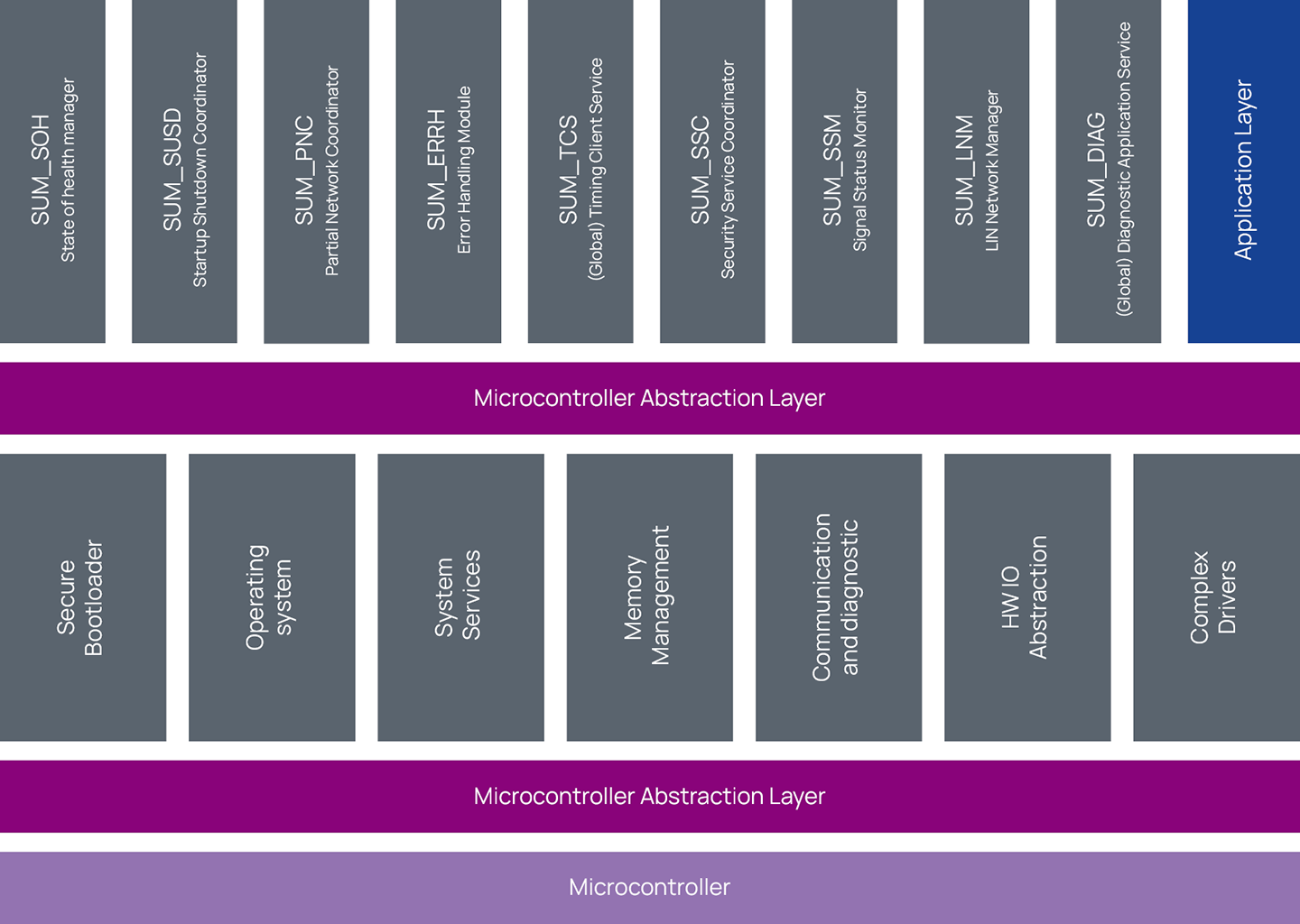
ETAS is committed to the development and maintenance of the Standardized Utility Modules to be compliant with any updates from GM. Based on our extensive AUTOSAR experience, we are proactively working with GM to keep refining the specifications.
ETAS RTA-SUM provides the following list of SUMs
SUM_SUSD – Startup Shutdown Coordinator
SUM_SUSD contains the following functions: Application State Manager, Application SW-C Start / Shutdown, Operating/Battery Voltage Monitor, and Wakeup Reason DID. To understand the functions performed by SUM_SUSD, it is necessary to understand the behavior of the EcuM and BswM BSW modules as defined by AUTOSAR.
SUM_PNC - Partial Network Coordinator
SUM_PNC manages all of the BSW services related to Partial Networks (PNs) for an ECU that is a member of any PN. It shall be implemented in all ECUs that are members of any PN. This allows all other SW-Cs to function abstracted from the source of the data.
SUM_ERRH - Error Handling Module
SUM_ERRH is notified of error events created by BSW Production Errors or SUM error events. It filters the events with the appropriate debounce algorithm. Based on those results, SUM_ERRH notifies the Dem-Module (Diagnostic Event Manager) of an event and a test pass/fail for that event. The Dem-Module is responsible to maintain the status byte.
SUM_TCS - (Global) Timing Client Service
SUM_TCS is primarily intended to be used to provide a synchronized time stamp for the extended date record of a DTC in all ECUs designated as TS_Slave. SUM_TCS is not intended to provide any control functions or vehicle driver / passenger viewable display data.
SUM_TCS receives a signal (TimeSyncMessage) via the serial data communication bus from an ECU which has the Master Clock function (TS_Master). The resolution and transmission rate of the Master Clock signal is as defined by the diagnostic team.
SUM_SSC - Security Service Coordinator
SUM_SSC is the main SUM interfacing with the BSW Crypto Stack, so it manages all of the BSW services related to Security. SUM_SSC is intended to implement all security-related functionalities such as Message Authentication, ECU Security Unlock, and Security Peripheral Key Provisioning. The support of all of its features depends on the HSM availability on the ECU.
SUM_SSM - Signal Status Monitor
SUM_SSM is intended to define a standard implementation to interpret the various status indications of the data value which are associated with received serial data signals and provide a consistent interface to functional software. The scope of SUM_SSM is for handling status information related to the Signal Integrity and Source Integrity for received signals.
Signal Integrity status is determined by interpreting a "flag" or special value which indicates whether signals that were successfully received can be used by local SW-C. Source Integrity status is determined by detecting transmission errors from senders due to physical layer fault conditions.
These errors may use ECU specific or function specific fault handling strategies. SUM_SSM implements a set of standardized mechanisms used by the consumers of serial data signals to use or discard the signal data values.
SUM_LNM - LIN Network Manager
SUM_LNM manages interaction with the BSW services related to LIN Network Management for an ECU that is a master of any LIN Network. There is one SUM_LNM per network. So, for example, if an ECU is the LIN Master for three LIN networks, then that ECU must implement three standalone SUM_LNM software compositions which each control one LIN network.
SUM_DIAG - (Global) Diagnostic Application Service
SUM_DIAG is primarily intended to be used to implement application level diagnostic functionalities such as the verification of manufacturer pre-conditions for several UDS services, the management of Manufacturer Enable Counter value, and the management of Over The Air Programming State Flag.
SUM_SOH – State of Health Manager
The SUM_SOH deploys functionalities needed to support monitoring and reporting of multiple facets of the operational health of the ECU communication systems, HW, OS and SW components. With the implementation of specific software functions called Reliability Monitors, SUM_SOH is in charge of monitoring reset events, NVM and OS errors, shutdown delays, communication session events, and of watchdog manager supervised entities states. SUM_SOH provides data regarding such monitored events via ad-hoc DIDs.